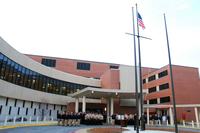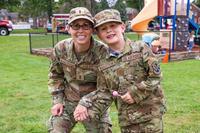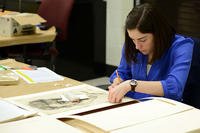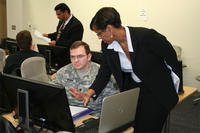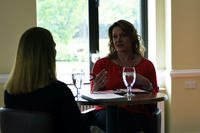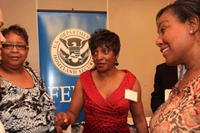Simone Gorrindo is a real writer. The kind of writer you want to be when you grow up. She’s also balancing a career in journalism with the military lifestyle -- no easy feat.
After seeing a column she penned for the New York Times’ At War series, we wanted to know:
How did you meet?
My husband Andrew and I were childhood friends in California’s Bay Area, where we both grew up. We reunited in our early twenties, fell in love and proceeded to live a lot of lives together before Andrew joined the Army.
We were forestry workers in the Canadian outback; long-term travelers in Indonesia; bartenders and food servers; students of the classics; journalists, editors.
We grew up in extremely liberal homes and were really unlikely candidates for this life, in many ways. When I get in touch with old friends, they are always shocked to discover that I'm married to a military man.
When Andrew decided to join the Army, I became obsessed with learning everything I could about the institution, the current wars and everyday Army life (though that term might actually be an oxymoron, since every day is so different).
What do you do for a paycheck?
Ah, a paycheck. That is a relic from another life. I haven't had a truly steady paycheck since I left my job as a full-time editor in New York City a year ago.
I do cobble together some income with freelance editing and writing work, and I'm working on some bigger writing projects currently that should hopefully bring in some good income this year.
But I am also doing work for which I'm not currently being paid: developing a book proposal; working as a contributing editor for Vela, a literary magazine for creative nonfiction written by women; writing and publishing personal essays.
What do you like best about your work?
When it comes to editing, I love working collaboratively with an author, being part of a project as it transforms and comes to fruition.
It gives me a break from the solitary writing life, which can get incredibly lonely sometimes.
In terms of writing, it depends on what kind of work I'm doing. In journalism, I love that I'm constantly learning something new, that the learning curve is perpetually steep. I love, too, being allowed into people's lives. It's a rare privilege.
In creative nonfiction, writing is how I come to understand myself and the world around me; it's how I make sense of things. Without it, my head is just pretty much full of white noise.
How did you get your job?
It took me years of searching, working and experimenting to really get into this field, although writing has always been my central passion.
My degree and references from Columbia's graduate school in journalism definitely helped me to get my most recent full-time job as a senior editor at Kindle Singles.
The editor is also a professor at Columbia, and was looking for high-level interns who could one day become full-timers.
We hit it off immediately: Our first real interview lasted four hours (the man loves to talk). That internship did become a job after six months, and I learned more than I can quantify from him. It was a tremendous opportunity.
The work I do now has come in through a few different channels: authors I've met at residencies; connections I've made through social media and at my old editing job; old friends from writing workshops.
Basically, I've very slowly -- and not terribly deliberately -- cultivated a small presence in different literary worlds.
How has being married to a servicemember impacted your own career? How did you get around that?
If my husband hadn't gone into the Army, it's likely I'd still be working 60- to 80-hour workweeks in New York City as an editor. So, it's hampered my career as an editor, but it's given me a lot more time to write, for which I'm really grateful.
What one piece of advice would you give to military spouses who want to balance volunteer work and professional work?
I'm still so new to this, so I don't feel like I'm in a position to give much advice on the subject, but I'll offer a bit of wisdom a fellow Army wife shared with me when I first got to Georgia: Support your spouse, but don't let your whole schedule -- and world -- revolve around him or her.
If he doesn't make it home for 6:00 dinner, go ahead and eat without him. If the only time you can see him during a crazy training cycle is at some ungodly hour, like 3 a.m., don't become nocturnal.
Be flexible, of course, but live your life; don't turn it upside down for your soldier. I'm still learning how to do that, but that piece of advice has helped me a lot.
How does your servicemember support your career?
In more ways than I can count. Things have been financially tight since we moved to Georgia, but he's encouraged me to use this time to focus on my writing instead of getting a full-time editing job (which are difficult to come by here, anyhow).
My newfound role as an Army wife -- which honestly still feels strange to say -- is something I write a lot about these days, and to do it any justice requires a certain measure of honesty.
So much in the Army is about fitting in, which means that a lot of us end up veiling certain parts of ourselves. I know I certainly do.
The Rangers are also supposed to exhibit "quiet professionalism," so my husband almost never refers openly to his unit. The fact that he continually gives me the go-ahead to write about being a Ranger wife with such candor is really amazing.
I don't think he's always 100% comfortable with it, but he would never want to stand in the way of my work.
And beyond all that, he really is my biggest fan. Writing is an uncertain path to follow, and whenever I am doubting myself, he is there to remind me of all the reasons I do it, all the reasons I should do it. He believes in me unendingly, and it's a tremendous gift.
What is the one strength you use on the job every day?
I've been told I'm pretty unflappable. I expect the road to be uneven and swerving. I expect things to fall apart before they come together. I expect the outcome to look dramatically different than the initial plan.
I suppose this is realism. It allows me to be pretty adaptable; I'm comfortable with changing things up midstream. I suppose this helps me out in my role as an Army spouse as well.
What was the hardest lesson you needed to learn about work?
I've discovered that self-doubt never disappears, and that, often, you just have to write through it, fighting against it every day despite knowing that fight will begin anew each morning.
What keeps you working?
Readers (like you!) who reach out to me. Writing can get lonely, and it means the world to know you're actually connecting with people, not just sending messages into the void.
Also, I start to become a little crazy and unhappy if I don't write. Writing keeps me sane and helps me understand my place in the world.
What is your version of happily ever after?
Publishing a few books. Being a fantastic mother. Spending the rest of my life with my husband. Living close to awe-inspiring wilderness. Having enough pocket change to travel. Finding a way to negotiate my different writing passions -- creative nonfiction, journalism and fiction. Having a solid writing community. Changing at least one life for the better.
Keep Up with the Ins and Outs of Military Life
For the latest military news and tips on military family benefits and more, subscribe to Military.com and have the information you need delivered directly to your inbox.

